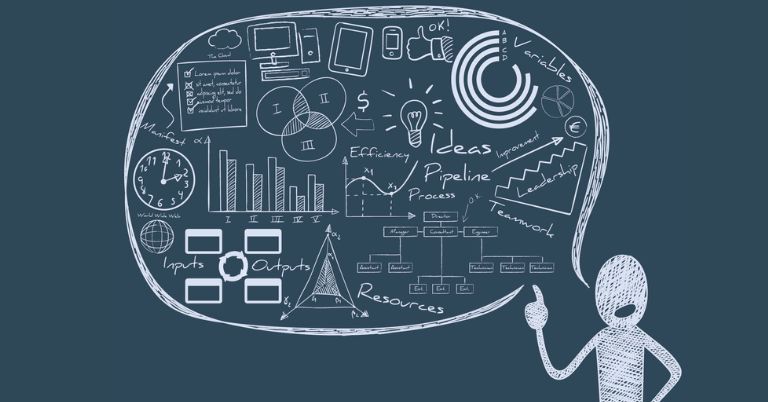Analytical thinking is the process of evaluating information and data to understand patterns and draw logical conclusions. It helps in problem-solving and decision-making.
In today’s highly data-driven world, analytical thinking is crucial for identifying trends, solving complex problems, and making informed decisions. It involves breaking down complex problems into manageable parts, analyzing various perspectives and possibilities, and drawing conclusions based on evidence and logical reasoning.
Analytical thinking is valued in many fields, including business, science, technology, and finance, as it enables individuals to approach challenges with a structured and rational mindset. By leveraging analytical thinking, individuals can identify opportunities, generate innovative ideas, and solve problems efficiently, ultimately leading to better outcomes.
Let's See the Topic Overview
Analytical Thinking: Understanding The Basics
Analytical thinking is a fundamental skill that involves breaking down complex problems into smaller parts and understanding their relationships. It requires logical reasoning and the ability to gather and evaluate information in order to make informed decisions.
Are you a problem solver? Do you possess the ability to analyze situations critically and find effective solutions? If so, you are likely using analytical thinking. In this section, we will explore what analytical thinking is, understand its importance in problem-solving, and differentiate it from other types of thinking.
What Is Analytical Thinking?
- Analytical thinking is a cognitive skill that involves breaking down complex problems or situations into smaller, more manageable components.
- It involves examining information methodically, identifying patterns, connections, and relationships between various factors.
- Analytical thinkers tend to approach problems in a logical and systematic manner, gathering and evaluating evidence to draw well-informed conclusions.
The Importance Of Analytical Thinking In Problem-Solving:
- Effective problem-solving relies heavily on analytical thinking skills, as it enables individuals to assess situations objectively and make rational decisions.
- Analytical thinking allows for a comprehensive understanding of problems, enabling individuals to identify the root cause of issues and design appropriate solutions.
- It helps in generating multiple options and evaluating their potential outcomes, ensuring the implementation of the most effective and efficient solution.
How Analytical Thinking Differs From Other Types Of Thinking:
- Analytical thinking vs. critical thinking:
- Critical thinking involves evaluating arguments and evidence objectively to form reasoned judgments.
- Analytical thinking, on the other hand, focuses on examining information and situations to understand their underlying components and relationships.
- Analytical thinking vs. creative thinking:
- Creative thinking involves generating novel ideas, connections, and solutions.
- Analytical thinking, by contrast, involves focusing on the logical analysis and evaluation of information to find the most appropriate solution.
- Analytical thinking vs. lateral thinking:
- Lateral thinking involves approaching problems from unconventional angles, often leading to out-of-the-box solutions.
- Analytical thinking, however, mainly emphasizes the logical and systematic examination of information to arrive at well-reasoned conclusions.
By understanding the basics of analytical thinking, recognizing its significance in problem-solving, and distinguishing it from other types of thinking, you can enhance your decision-making abilities and become a more effective problem solver. So, sharpen those analytical thinking skills and unlock your potential to tackle complex challenges with clarity and precision.
Developing Analytical Thinking Skills
Analytical thinking is the ability to solve complex problems by breaking them down into smaller components and analyzing them systematically. It involves gathering and evaluating information, identifying patterns and trends, and making logical conclusions. Developing analytical thinking skills can greatly enhance problem-solving abilities and decision-making processes.

Analytical thinking is a crucial skillset that enables individuals to dissect complex problems, gather and evaluate information, and make informed decisions. Developing analytical thinking skills is essential for both personal and professional growth. It expands your cognitive abilities and enhances your problem-solving capabilities.
Let’s explore three key ways to develop and strengthen analytical thinking skills.
Enhancing Critical Thinking Abilities:
- Understand the problem: Take the time to fully comprehend the problem at hand by breaking it down into manageable components.
- Gather relevant information: Conduct thorough research, seek different perspectives, and gather data to acquire a comprehensive understanding of the issue.
- Analyze and evaluate: Utilize logical reasoning to scrutinize the information, identify patterns, and assess the strengths and weaknesses of various arguments.
- Draw conclusions: Based on your analysis, draw well-founded conclusions and outline possible solutions to the problem.
Strengthening Logical Reasoning Skills:
- Develop a systematic approach: Train yourself to think sequentially, considering cause-and-effect relationships and logical progressions when analyzing problems.
- Spot inconsistencies: Sharpen your ability to identify inconsistencies in information or arguments by evaluating the logical flow and coherence of ideas.
- Question assumptions: Challenge assumptions and seek evidence to support or refute them, developing a habit of critical thinking.
- Practice deductive and inductive reasoning: Practice using deductive reasoning to draw specific conclusions from general statements and use inductive reasoning to make general hypotheses based on specific observations.
Boosting Problem-Solving Capabilities:
- Break down problems: Break complex problems into smaller, manageable parts to prevent overwhelm and facilitate systematic analysis.
- Develop alternative perspectives: Encourage creativity by generating multiple solutions and considering different viewpoints.
- Test and refine solutions: Implement potential solutions and evaluate their effectiveness. Learn from any shortcomings and modify your approach accordingly.
- Embrace continuous learning: Engage in activities such as puzzles, brain teasers, or strategic games that promote analytical thinking and problem-solving skills.
By actively engaging in these practices, you can cultivate and refine your analytical thinking abilities, empowering yourself to approach challenges with a structured, logical, and informed mindset.
Applying Analytical Thinking In Real Life
Analytical thinking involves evaluating information, breaking it down, and discovering patterns to make informed decisions. By utilizing this cognitive skill in real-life situations, we can unravel complexities, solve problems, and enhance our decision-making abilities.
Analytical thinking is a valuable skill that allows individuals to break down complex problems, make data-driven decisions, and solve everyday issues effectively. By engaging in analytical thinking, you can approach situations in a methodical and logical manner, leading to more accurate problem-solving and decision-making.
In this section, we will explore how analytical thinking can be applied in real-life situations.
Analyzing Complex Situations:
- Break down complex problems into smaller components: Breaking down complex situations into smaller, more manageable parts can help you gain a better understanding of the issue at hand.
- Identify patterns and trends: Analytical thinking involves looking for patterns and trends within complex situations, allowing you to identify key factors that contribute to the problem.
- Evaluate cause and effect relationships: Analyzing complex situations involves examining the cause and effect relationships between different variables, enabling you to understand the underlying factors that influence the problem.
- Consider multiple perspectives: Analytical thinking encourages you to consider multiple perspectives and viewpoints when analyzing complex situations, helping you gain a holistic understanding of the problem.
Making Data-Driven Decisions:
- Gather relevant data: Analytical thinking involves gathering and analyzing relevant data to inform your decision-making process. By collecting accurate and reliable data, you can make informed decisions.
- Interpret and analyze data: Analytical thinking requires the ability to interpret and analyze data effectively. By examining the data, you can uncover insights and patterns that can guide your decision-making.
- Consider different scenarios: Analytical thinking encourages you to consider different scenarios and outcomes based on the available data. This helps you evaluate the potential impact of your decisions and choose the best course of action.
Solving Everyday Problems Analytically:
- Define the problem: Analytical thinking involves clearly defining the problem at hand. By understanding the problem thoroughly, you can develop effective solutions.
- Brainstorm potential solutions: Analytical thinking encourages you to generate multiple potential solutions to everyday problems. This fosters creativity and allows you to explore different possibilities.
- Evaluate the pros and cons: Analytical thinking requires evaluating the pros and cons of each potential solution. By considering the advantages and disadvantages, you can make an informed decision.
- Test and refine solutions: Analytical thinking involves testing and refining solutions to everyday problems. By gathering feedback and making adjustments, you can improve the effectiveness of your solutions.
Applying analytical thinking in real-life situations can enhance problem-solving abilities, enable data-driven decision-making, and facilitate effective solutions to everyday problems. By developing and honing your analytical thinking skills, you can approach complex situations with confidence and improve your overall problem-solving abilities.
Strategies To Master Analytical Thinking
Analytical thinking is a cognitive ability that involves breaking down complex problems into smaller parts to understand and solve them effectively. In order to master analytical thinking, one can employ strategies such as gathering relevant data, applying logical reasoning, and exploring multiple perspectives.
These techniques enhance problem-solving skills and facilitate decision-making processes.
Analytical thinking is a valuable cognitive skill that allows individuals to dissect complex problems and come up with logical solutions. By breaking down problems into smaller components, utilizing different perspectives and viewpoints, and asking effective analytical questions, individuals can enhance their analytical thinking ability.
Here are some strategies to master analytical thinking:
Breaking Down Problems Into Smaller Components:
- Break the problem into smaller, manageable parts: This helps to understand the problem better and identify its core elements.
- Analyze each component separately: Examine the details and characteristics of each part to gain a comprehensive understanding.
- Identify relationships and connections: Look for patterns or connections among the different components to identify potential solutions.
Utilizing Different Perspectives And Viewpoints:
- Seek diverse input: Gather input from different people with various backgrounds and experiences to gain multiple perspectives on the problem.
- Challenge assumptions: Question your own assumptions and biases to avoid being limited by preconceived notions.
- Encourage critical thinking: Foster an environment where everyone feels comfortable sharing their thoughts and ideas.
Asking Effective Analytical Questions:
- Start with the “what” and “why” questions: Begin by understanding the problem thoroughly, focusing on what the issue is and why it exists.
- Explore cause and effect: Investigate the root causes of the problem and consider the potential consequences of different actions.
- Don’t settle for surface-level answers: Dig deeper by asking probing questions that require thoughtful analysis and reasoning.
By following these strategies, individuals can improve their analytical thinking skills and become more effective problem solvers. Remember, analytical thinking is a skill that can be developed with practice and effort. So, start applying these strategies today and enhance your ability to think critically and solve complex problems.
Common Obstacles In Analytical Thinking
Analytical thinking involves the ability to break down complex problems or situations into smaller components for thorough understanding and evaluation. Common obstacles in analytical thinking can include biases, lack of data or information, narrow perspectives, emotional reasoning, and cognitive biases.

Overcoming these obstacles requires open-mindedness, critical thinking skills, and a systematic approach to analysis.
Analytical thinking is a valuable skill that involves breaking down complex problems into smaller, more manageable parts, and systematically evaluating them to make informed decisions. However, there are certain obstacles that can hinder our ability to think analytically. Let’s take a closer look at two common obstacles and how to overcome them.
Confirmation Bias And Its Impact:
- Confirmation bias is when individuals favor information that confirms their preexisting beliefs or opinions, while disregarding or downplaying contradictory evidence.
- This bias can significantly impact analytical thinking by distorting our ability to impartially evaluate information and make objective decisions.
- To overcome confirmation bias, it is important to be aware of our own biases and actively seek out alternative viewpoints and evidence that may challenge our initial assumptions.
- Engaging in open-minded discussions or seeking input from a diverse range of individuals can help counter confirmation bias and promote more robust analytical thinking.
Overcoming Cognitive Biases:
- Cognitive biases are mental shortcuts or patterns of thinking that often lead to errors in judgment and decision-making.
- Some common cognitive biases include anchoring bias, availability bias, and hindsight bias.
- To overcome cognitive biases, it is crucial to be aware of their existence and actively challenge our own thought processes.
- Engaging in critical thinking exercises, questioning underlying assumptions, and considering multiple perspectives can help reduce the impact of cognitive biases and enhance analytical thinking.
Dealing With Information Overload:
- In today’s digital age, we are bombarded with vast amounts of information, making it challenging to filter through and extract relevant insights.
- To navigate information overload and maintain analytical thinking, it is crucial to develop effective information management strategies.
- Prioritize information sources that are reliable and reputable, and consider utilizing tools such as data visualization or note-taking to organize and simplify complex information.
- Additionally, practicing mindfulness and setting aside dedicated time for focused analysis can help prevent information overload from overwhelming analytical thinking.
Remember, analytical thinking is a skill that can be honed and improved with practice. By recognizing and actively addressing common obstacles such as confirmation bias, cognitive biases, and information overload, we can enhance our ability to think critically and make better informed decisions.
Sharpening Analytical Skills Through Practice
Develop your analytical thinking skills through regular practice and sharpen your ability to dissect and solve complex problems effectively. By engaging in analytical exercises and challenges, you’ll enhance your critical thinking and decision-making skills, increasing your competence in this important area.
What Is Analytical Thinking?
Analytical thinking is a cognitive skill that involves the ability to gather and analyze information, evaluate different perspectives, and draw logical conclusions. It is a valuable skill to have in various aspects of life, as it helps people make sound decisions, solve complex problems, and improve overall problem-solving abilities.
Engaging in logic puzzles and brain teasers:
- Solving logic puzzles and brain teasers helps exercise the brain’s analytical muscles and enhances critical thinking abilities.
- Engaging in these activities encourages individuals to think outside the box, apply creative problem-solving techniques, and identify patterns and relationships.
Familiarizing with deductive and inductive reasoning:
- Deductive reasoning involves drawing conclusions based on widely accepted principles, generalizations, or premises.
- Inductive reasoning involves making generalizations or predictions based on specific observations or evidence.
Practicing critical thinking exercises:
- Critical thinking exercises provide opportunities to analyze and evaluate different types of information, arguments, and ideas.
- It helps individuals develop a questioning mindset, identify biases and assumptions, and make informed judgments.
Analytical thinking is a crucial skill that can be honed through practice. Engaging in logic puzzles and brain teasers, familiarizing oneself with deductive and inductive reasoning, and practicing critical thinking exercises are effective methods to sharpen analytical skills. By consistently seeking opportunities to exercise these skills, individuals can enhance their ability to analyze, evaluate, and make sound decisions in various aspects of life.
The Role Of Analytical Thinking In Professional Success
Analytical thinking plays a pivotal role in professional success by enabling individuals to assess complex problems, identify patterns, and make informed decisions. It involves gathering and analyzing relevant data to develop logical and innovative solutions, leading to improved productivity and achievement in various fields.

Problem-Solving Abilities As A Sought-After Skill
- Analytical thinking is a highly valued skill in today’s professional landscape, especially when it comes to problem-solving.
- Possessing strong problem-solving abilities enables individuals to approach challenges with a logical and systematic mindset.
- A person with analytical thinking skills can break down complex problems into smaller, more manageable parts, making it easier to identify potential solutions.
- Employers and organizations recognize the importance of problem-solving skills and often seek candidates who can demonstrate their ability to think analytically.
- Being able to offer innovative and effective solutions can set professionals apart from their peers and open doors to new opportunities.
How Analytical Thinking Enhances Decision-Making
- Analytical thinking plays a vital role in decision-making processes, helping individuals gather and assess information to make informed choices.
- By utilizing analytical thinking, professionals can evaluate data, facts, and various perspectives to make logical and well-thought-out decisions.
- Through critical analysis, individuals can identify patterns, trends, and relationships among information, leading to more accurate and reliable decision-making.
- Analytical thinking allows individuals to consider the potential outcomes and consequences of different options, leading to more calculated and effective decisions.
- Professionals who can demonstrate strong analytical thinking skills are often better equipped to handle complex decision-making situations and navigate uncertainties.
Analytical Thinking In Various Industries And Professions
- Analytical thinking is not limited to specific industries or professions; it is a versatile skill that can be applied across a wide range of fields.
- In the field of business and finance, analytical thinking is crucial for market analysis, financial forecasting, risk assessment, and strategic planning.
- In technology and engineering sectors, analytical thinking plays a vital role in problem-solving, troubleshooting, system optimization, and innovation.
- Healthcare professionals utilize analytical thinking to diagnose and treat patients, analyze medical data, and conduct medical research.
- Analytical thinking is also essential in the fields of marketing, advertising, and market research, as professionals analyze consumer behavior and market trends to develop effective strategies.
- In the legal and justice system, analytical thinking helps lawyers analyze evidence, build arguments, and make sound judgments.
Remember, analytical thinking is a skill that can be developed and honed over time. By actively practicing and applying analytical thinking techniques, professionals can enhance their problem-solving abilities, decision-making skills, and overall career success.
Analytical Thinking In Education
Analytical thinking in education involves the ability to critically analyze information and solve problems using logical reasoning and evidence-based approaches. It equips students with invaluable skills to make informed decisions and navigate complex challenges in their academic and professional lives.
Analytical thinking plays a significant role in education by fostering critical thinking skills and preparing students for future challenges. By incorporating analytical thinking in the curriculum, educators can equip students with valuable problem-solving abilities that extend beyond academic subjects. Let’s explore how analytical thinking is integrated into education:
Incorporating Analytical Thinking In The Curriculum:
- Emphasizing real-world applications: By including practical examples and case studies in the curriculum, students can develop analytical skills that can be applied to real-life situations.
- Integrating interdisciplinary subjects: Encouraging students to connect knowledge from different disciplines fosters analytical thinking as they learn to approach problems from a holistic perspective.
- Incorporating data analysis: Teaching students to gather, analyze, and interpret data not only enhances their analytical thinking skills but also equips them for data-driven decision-making in various fields.
Teaching Students To Think Critically:
- Developing problem-solving strategies: By guiding students through the process of identifying problems, generating possibilities, and evaluating potential solutions, educators can enhance students’ critical thinking abilities.
- Encouraging inquiry-based learning: By asking open-ended questions and promoting curiosity, educators foster critical thinking by encouraging students to explore and investigate different perspectives.
- Providing opportunities for reflection: Allowing students to reflect on their learning experiences nurtures critical thinking by encouraging them to question assumptions and analyze the effectiveness of their approaches.
Preparing Students For Future Challenges:
- Developing analytical thinking as a lifelong skill: By prioritizing analytical thinking in education, students are equipped with a fundamental skill that can help them adapt and thrive in a rapidly changing world.
- Enhancing problem-solving abilities: Analytical thinking enables students to approach complex problems systematically, break them down into manageable parts, and generate innovative solutions.
- Building resilience: Through analytical thinking, students develop the ability to overcome challenges, think creatively, and persevere in the face of obstacles, preparing them for the ever-evolving demands of the future.
By incorporating analytical thinking in education, educators nurture critical thinking skills, promote problem-solving abilities, and prepare students for the challenges of the future. By emphasizing practical application, interdisciplinary learning, and data analysis, students develop the capacity to think critically and approach problems from different angles.
This equips them with lifelong skills that are vital in navigating an increasingly complex world.
Conclusion
Analytical thinking is a vital skill that helps individuals dissect complex problems and make informed decisions. By actively questioning assumptions, connecting dots, and critically evaluating evidence, analytical thinkers gain a deeper understanding of the situations they encounter. This type of thinking is important not only in professional settings but also in our daily lives, as it enables us to solve problems efficiently and effectively.
Moreover, analytical thinking empowers us to offer creative solutions and adapt to changing circumstances. It allows us to break down problems into manageable parts, identifying patterns and trends that might otherwise go unnoticed. Ultimately, honing our analytical thinking skills can lead to improved decision-making, enhanced problem-solving abilities, and a greater capacity for innovation.
Whether you’re a student, professional, or simply looking to stimulate your cognitive abilities, developing analytical thinking will undoubtedly prove beneficial in navigating the complex world we live in.












